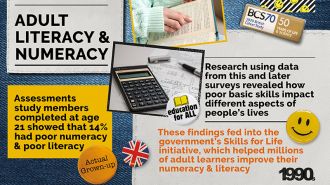- Our studies
- Our research
- Publications and resources
- Data access and training
- About
- News
- Events
- Get in touch
- Join our mailing list
Welcome to our news and blogs section. Here you’ll find the latest developments and insights from across our longitudinal studies.
Growing Up in the 2020s is the country’s first comprehensive long-term study tracking adolescents’ development and educational outcomes following the Covid-19 pandemic.

Researchers from around the world have been using CLS study data to tackle important questions. Here is a round-up of nearly 100 new pieces of research that we’ve added to the CLS bibliography between April and June 2021.

This project aims to examine the experiences of care leavers who became parents (of cohort members) and the intergenerational impact on their children’s outcomes.

At age 17, 9% of males have carried or used a weapon, with one in four of those involved in this form of serious offending reporting they are gang members, according to UCL researchers.

Researchers from around the world have been using CLS study data to tackle important questions. Here is a round-up of over 70 new pieces of research that we’ve added to the CLS bibliography between January and March 2021.

The Centre for Longitudinal Studies (CLS) is part of the team behind a new cohort study of current Year 11 students, which will investigate the educational and employment inequalities brought about by the COVID-19 crisis.

Researchers from around the world have been using CLS study data to tackle important questions. Here is a round-up over 40 new pieces of research that we’ve added to the CLS bibliography between October and December 2020.

Celebrating 50 years of the 1970 British Cohort Study – BCS70 findings on adult numeracy and literacy helped to kickstart a series of government education initiatives that would improve the basic skills of millions of British adults during the 2000s.

Children growing up in families with expensive homes have fewer emotional and behavioural problems, finds new research led by the UCL Centre for Longitudinal Studies (CLS) based at the UCL Social Research Institute.

Members of Generation X who lived in Britain’s declining industrial heartlands in the 1980s were more likely to play truant during their school years and to be involved in crime as adults, compared to those who grew up in more advantaged areas.
In honour of the 50th anniversary of the 1970 British Cohort Study, this scientific conference will showcase the latest cutting-edge research using CLS cohort data.

Millennium Cohort Study findings have provided evidence for The Children’s Society’s eighth annual Good Childhood Report, which examines the state of children’s wellbeing across the UK.

Are boys more sensitive to the state of the local job market when choosing their GCSE subjects? And why are migrant and ethnic minority mothers at increased risk of mental ill health? Researchers have been using CLS study data to tackle these and other key questions.
Ryan Bradshaw
Senior Communications Officer
Phone: 020 7612 6516
Email: r.bradshaw@ucl.ac.uk